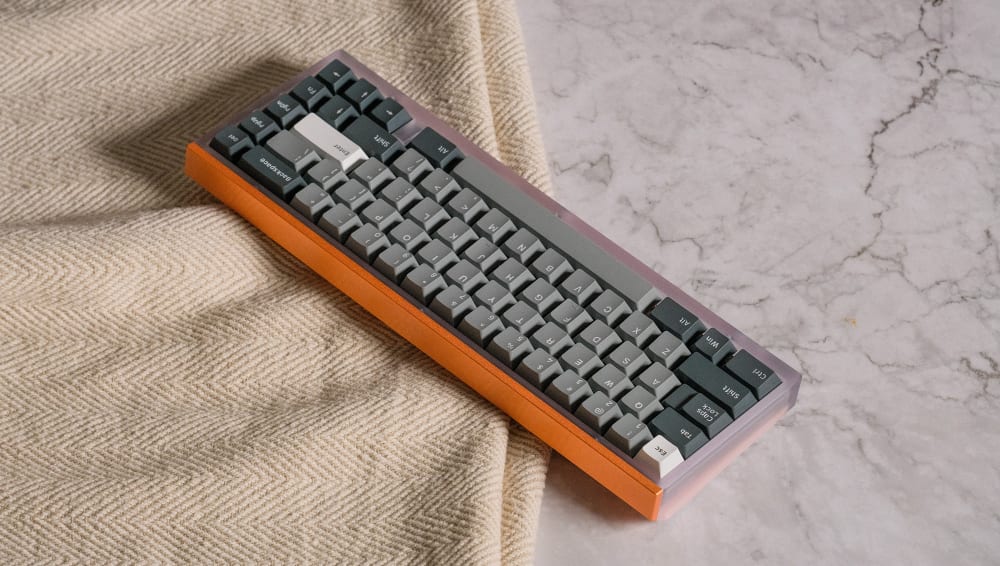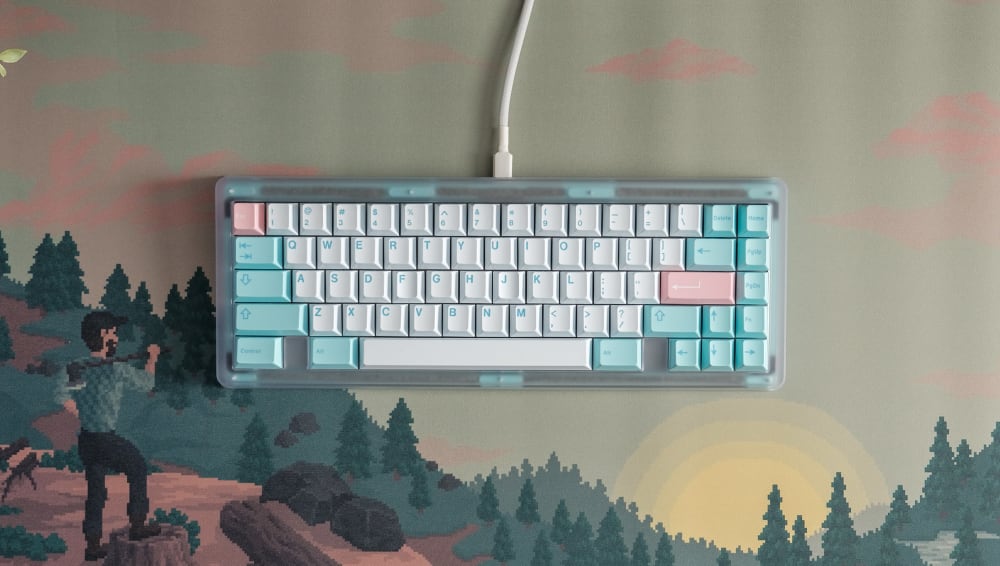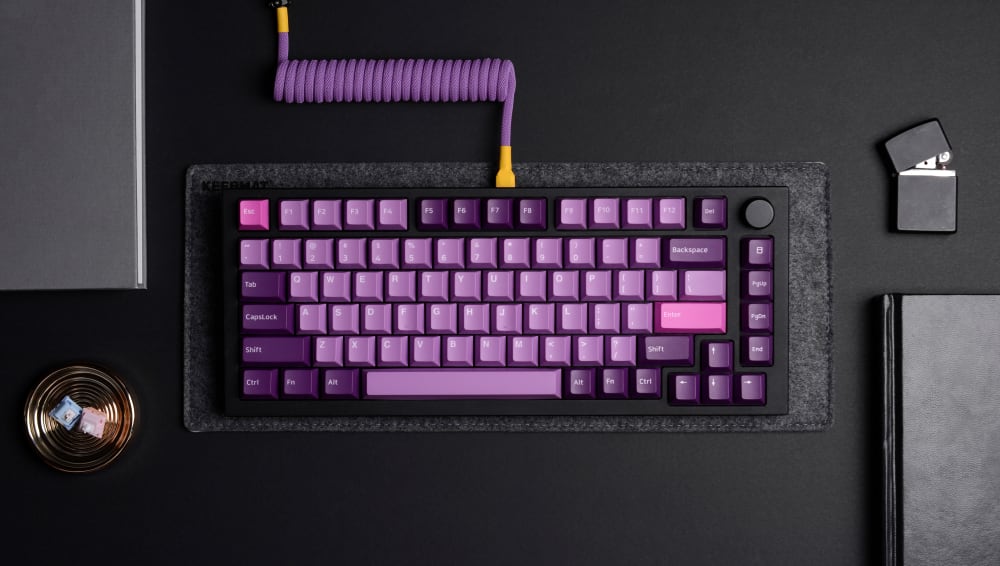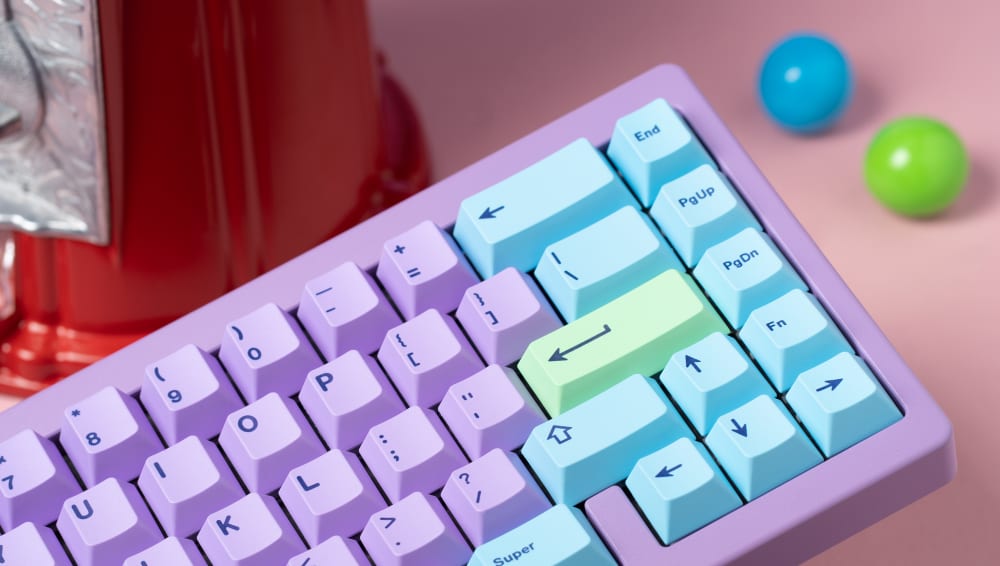Catherine L.
Aug 8, 2022
•6 minutes
GMK vs PBT Keycaps: What’s the difference?
In this post we explore the similarities and differences between GMK keycaps (ABS) and PBT keycaps to help you determine which is best for mechanical keyboards.


PolyCaps Seal V2 PBT Keycaps with a towel
The last few years have brought about a renaissance of mechanical keyboards.
Writers, programmers, and gamers alike have flocked to mechanical keyboards for their tactility, unique color-schemes, RGB lighting, and distinctive sound, but with this explosion of popularity has come a commiserate explosion in options.
PBT, ABS, POM — the vocabulary of mechanical keyboards is in a state of constant growth and flux, but two important ones for you to know about are GMK and PBT.
What Are GMK and PBT Keycaps?
PBT keycaps get their name from the material they’re made of: Polybutylene Terephthalate. If that seems like a mouthful, GMK keycaps get their name from Manfred Gunter, Jurgen Meinhardt, and Wolfgang Kredler. Their initials — G, M, and K — were originally used to name their electronic design company in 1992, but when they started manufacturing keycaps in 2011, they quickly became household names among mechanical keyboard enthusiasts.


GMK Keycaps on Sierra Sunrise Mat
While PBT keycaps contain Polybutylene Terephthalate, GMK manufactures their keycaps with Acrylonitrile Butadiene Styrene, or ABS. The different properties of these two materials are what gives GMK and PBT keycaps their distinct qualities and differences.
While there are any number of X-factors that draw users to a particular set of keycaps, the three properties that best explain the differences between GMK and PBT keycaps are look, feel, and performance.
How they look
When it comes to looks, there are pros and cons to both GMK and PBT keycaps. The ABS material GMK uses holds more saturation than their PBT counterparts, so GMK keycaps frequently come in brighter colors, if that’s what you’re looking for. Also, ABS is an easier plastic to machine, so you'll normally find less legend inconsistencies in ABS keycaps. While PBT keycaps may have slightly more subtle colorations, people love them for their texture.
PBT keycaps have a textured finish that takes a while to fade over time, while ABS keycaps tend to wear down and take on an oily sheen in a matter of days or weeks. It's important to note that both ABS and PBT keycaps shine eventually.


PolyCaps Octopus PBT Keycaps
Texture aside, the decoration of PBT and GMK keycaps can also vary quite a bit. There are two main styles of legend manufacturing: double-shot and dye-sublimated keycaps.
- Dye-sublimated keycaps have ink injected directly into the melted plastic to embed the design into the plastic itself. This means that the design won’t wear off with normal wear and tear the way an etched design would. However, it does mean that lines will be slightly less sharp and the design may appear slightly more “blurred” compared to double shot keycaps. PBT keycaps most frequently use dye-sublimation. The PolyCaps series of keycaps offers both dye-sublimated and double-shot keycaps made from PBT.
- Double-shot keycaps include two separate pieces of plastic (hence the “double”) with the design molded into the material itself. This means that the design is a part of the keycap itself, rather than sublimated into it. Like sublimated keycaps, this means that the design won’t wear away after years of use, but it also makes for a sharper, better-defined image as the two pieces of plastic don’t “bleed” together the way sublimated keycaps can. GMK keycaps can be either dye sublimated or double shot.
How they feel
One of the main differences between PBT and GMK keycaps is the way the material feels. While a keyboard is a striking piece of decoration, keycaps are more than just a pretty face. The way a keycap feels is an important consideration, especially for frequent users.
PBT keycaps have a unique texture and feel that sets them apart from other materials. PBT keycaps have a sandy or silky texture — not rough, but not mirror-smooth. ABS, on the other hand, may have a similar texture out of the box, but develops a shiny, polished look and slippery, even oily feel after continuous use.


PolyCaps Seal V2 PBT Close-up
Contrary to popular belief, ABS keys don’t take on this greasy sensation by picking up moisture and oil from your fingertips — it’s just a byproduct of wear and tear. With normal use, the texture wears off the keycaps, leaving them polished and smooth. This is one of the main reasons that ABS appears less frequently in high-end sets, because they don’t stand up to as much wear-and-tear as their PBT counterparts.
Keycap Performance
Finally, how well do PBT and GMK keycaps perform compared to each other? PBT is a stronger material than ABS. This means that PBT is slower to wear down — even after years of use, PBT keycaps can look and feel as good as new — but it also means manufacturing them is more challenging. Since PBT is a stronger material, it has a higher melting point, which means longer time to cool. This extended cooling time increases the chance of warping.
Warping is mostly a consideration for the larger keys such as the space bar or shift key, but this added liability makes them more expensive to produce and more prone to warp.


PolyCaps Candy Shop PBT Keycaps
On the other hand, the softness of ABS causes it to wear down over time, resulting in faded designs, weathered profiles, and uneven keys.
Which One Should I Get: GMK or PBT?
GMK and PBT keycaps both have their pros and cons. While the ABS used by GMK comes in more vibrant colors, the feel and softness of the material are downsides. PBT, on the other hand, may have more subdued coloring, but stand the test of time and provide a silky texture throughout their lifecycle. Ultimately, there’s no clear winner: PBT is used in many high-end setups, and GMK’s popularity is due to their quality.
So which one should you pick? Depending on the size of your keyboard, you could have as many as 104 reasons to choose.